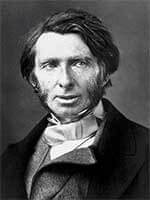
John Ruskin
Engelsk anmelder
Levde fra: 1819 - 1900
Kategori: Media Land: ![]() Storbritannia
Storbritannia
Født: 8 februar 1819 Døde: 20 januar 1900
Bøker fra John Ruskin
- Lectures on Architecture and Painting1
- Lectures on Art2
- Modern Painters, Vol IV2
- Modern painters, Vol V1
- Notes on the General Principles of Employment for the Destitute and Criminal Classes1
- Sesame and Lilies2
- The Correspondence of John Ruskin and Charles Eliot Norton1
- The seven lamps of architecture4
- The Stones of Venice2
- The Two Paths1
- Time and tide1
- Unto this Last1
Sitater 1 inntil 20 av 21.
-
Å gi almisse er ingenting med mindre du også tenker etter.
Opprinnelig:To give alms is nothing unless you give thought also.
― John Ruskin -
Alt koster sin egen kostnad, og en av våre beste dyder er et rettferdig ønske om å betale det.
Opprinnelig:Everything costs its own cost, and one of our best virtues is a just desire to pay it.
― John Ruskin -
Arbeid kan kort deles inn i positivt og negativt arbeid: positivt, det som produserer liv; negativt, det som gir døden.
Opprinnelig:Labour may be shortly divided into positive and negative labour: positive, that which produces life; negative, that which produces death.
Unto this Last (1860) IV, Ad Valorem― John Ruskin -
Arbeid uten glede er basal. Arbeid uten sorg er basal. Sorg uten arbeid er basal. Glede uten arbeid er basal.
Opprinnelig:Labour without joy is base. Labour without sorrow is base. Sorrow without labour is base. Joy without labour is base.
Time and tide (1867) Letter V, §21― John Ruskin -
Den høyeste belønningen for en persons slit er ikke hva de får for det, men hva de blir av det.
Opprinnelig:The highest reward for a person's toil is not what they get for it, but what they become by it.
tilskrevet― John Ruskin -
Den som har sannhet i hjertet, trenger aldri å frykte mangelen på overtalelse på tungen.
Opprinnelig:He who has truth at his heart need never fear the want of persuasion on his tongue.
The Stones of Venice (1853) I. The Foundations, §xcix― John Ruskin -
Det er bedre med det groveste verket som forteller en historie eller registrerer et faktum, enn det rikeste uten mening.
Opprinnelig:Better the rudest work that tells a story or records a fact, than the richest without meaning.
The seven lamps of architecture (1849) ch. VI, §7― John Ruskin -
Det er moralske og umoralske religioner, som er like forskjellige i forskrifter som i følelser; men det er bare én moral.
Opprinnelig:There are moral and immoral religions, which differ as much in precept as in emotion; but there is only one morality.
Lectures on Art (1870) Lecture II, §37― John Ruskin -
Det fantes ikke dårlig vær, men bare forskjellige typer behagelig vær.
Opprinnelig:There was no such thing as bad weather, but only different kinds of pleasant weather.
The Art of England (1883) The Hill-side― John Ruskin -
Fin kunst er det der hånden, hodet og menneskets hjerte går sammen.
Opprinnelig:Fine art is that in which the hand, the head, and the heart of man go together.
The Two Paths (1859) II, The Unity of Art, sect. 54― John Ruskin -
Fjell er begynnelsen og slutten på all natur.
Opprinnelig:Mountains are the beginning and the end of all natural scenery.
Modern Painters, Vol IV (1856) Part V, ch. XX, §1― John Ruskin -
Generelt er stolthet i bunnen av alle store feil.
Opprinnelig:In general pride is at the bottom of all great mistakes.
Modern Painters, Vol IV (1856) Part V, Chap III, Of Ternerian Light §22― John Ruskin -
Hva er poesi? Forslaget, fra fantasien, om edle grunner for de edle følelsene.
Opprinnelig:What is poetry? The suggestion, by the imagination, of noble grounds for the noble emotions.
Modern painters, Vol V (1860) Part VIII, ch. I, §13― John Ruskin -
Hvis en bok er verdt å lese, er den verdt å kjøpe.
Opprinnelig:If a book is worth reading, it is worth buying.
Sesame and Lilies (1865) §32― John Ruskin -
Hvis en bok er verdt å lese, er den verdt å kjøpe.
Opprinnelig:If a book is worth reading, it is worth buying.
Sesame and Lilies (1865) §32― John Ruskin -
Ingen person som ikke er en stor skulptør eller maler kan være arkitekt. Hvis han ikke er maler eller skulptør, kan han bare være byggmester.
Opprinnelig:No person who is not a great sculptor or painter can be an architect. If he is not a painter or sculptor, he can only be a builder.
The Seven Lamps of Architecture (1849) Apenda to Lectures I and II― John Ruskin -
Litt omtanke og litt vennlighet er ofte mer verdt enn mye penger.
Opprinnelig:A little thought and a little kindness are often worth more than a great deal of money.
The seven lamps of architecture (1849) II― John Ruskin -
Livet uten industri er skyld, og industri uten kunst er brutalitet.
Opprinnelig:Life without industry is guilt, and industry without art is brutality.
Lectures on art (1870) III― John Ruskin -
Når vi bygger, la oss tenke at vi bygger for alltid.
Opprinnelig:When we build, let us think that we build for ever.
The seven lamps of architecture (1849) VI, §10― John Ruskin -
Straff er det siste og minst effektive virkemiddelet i hendene på lovgiver for forebygging av kriminalitet.
Opprinnelig:Punishment is the last and least effective instrument in the hands of the legislator for the prevention of crime.
― John Ruskin
Alle John Ruskin kjente sitater og ordtak du alltid finner på Aforismen.no